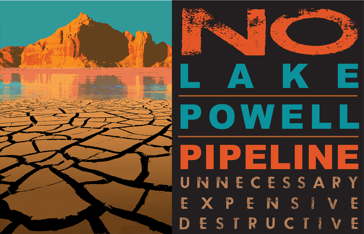- Joined
- Aug 10, 2021
- Messages
- 1,269
- Reaction score
- 955
- Gender
- Male
- Political Leaning
- Independent
How could anyone be against both massive debt and taking water from other states as the drought continues?
"The $2.24 billion Lake Powell Pipeline is a massive new diversion of Colorado River water that is completely unnecessary for Utah’s future. The Pipeline would siphon between 83,000 and 86,000 acre-feet of water annually from Lake Powell and pump it 2000 feet uphill and across 140 miles of pristine desert to some of America’s nation-leading water users in Washington County in southwest Utah. The Pipeline is being proposed by the Utah Division of Water Resources and will saddle Washington County residents with billions of dollars of debt."

 lake-powell-pipeline.org
lake-powell-pipeline.org
"The $2.24 billion Lake Powell Pipeline is a massive new diversion of Colorado River water that is completely unnecessary for Utah’s future. The Pipeline would siphon between 83,000 and 86,000 acre-feet of water annually from Lake Powell and pump it 2000 feet uphill and across 140 miles of pristine desert to some of America’s nation-leading water users in Washington County in southwest Utah. The Pipeline is being proposed by the Utah Division of Water Resources and will saddle Washington County residents with billions of dollars of debt."

The Lake Powell Pipeline | Unnecessary. Expensive. Destructive.
The Utah Division of Water Resources wants to build an unnecessary and expensive pipeline project that will burden taxpayers and ratepayers with generations of debt and massive water rate increases. This government spending project comes with enormous risks and impacts and is entirely unnecessary fo

